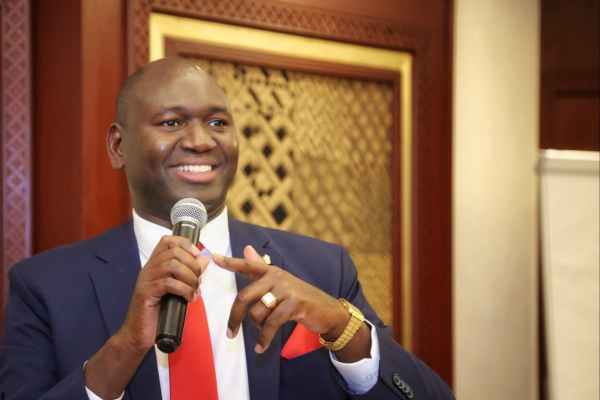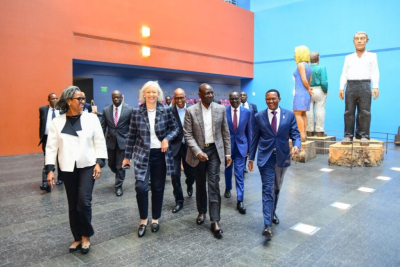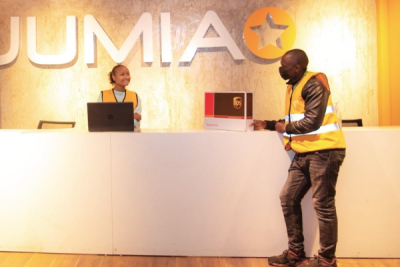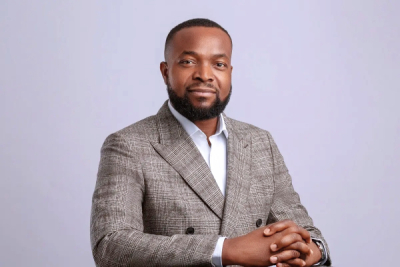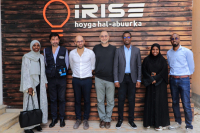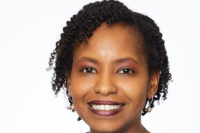With the advent of digital technology, Kenya has turned to biometrics to improve the identification of its population. Thanks to a system already in place, in the coming months the executive will be able to provide a digital identity to all registered citizens, refugees, and foreigners.
Kenya has postponed the launch of its "Maisha Namba" digital identification system and biometric identity cards originally scheduled for October 2. In a statement released on Friday, September 29, Julius Bitok (photo), Principal Secretary of Immigration and Citizen Services, said that a new date would be communicated in due course.
“We wish to inform the public and all stakeholders that due to unavoidable circumstances, the official launch of the Maisha number and the digital ID ecosystem that was to be presided over by his excellency, President William Ruto on October 2nd has been postponed,” Julius Bitok indicated in the release, adding that nationwide public and stakeholder engagement activities and forums on Maisha Namba would continue as planned.
Last August, when signing an agreement with the UNDP to raise funds to support the development of the said system, the government indicated that it would be launched on October 2. The system is in line with the executive's actions to improve government services through digital transformation, to digitize up to 80% of the said services. Through the new system and the biometric identity card, the government aims to provide every Kenyan with a unique number that will become his/her personal identity number for life.
Samira Njoya
He is an experienced software developer with a proven track record in several companies. His company, Comparoshop, uses artificial intelligence to optimize e-commerce operations across Africa.
Didier Tagne (photo) is a co-founder of Comparoshop, a company that uses artificial intelligence to improve e-commerce operations in Africa. Born in Cameroon, he began higher education, in 2018, at the University of Douala. He enrolled in computer science but dropped out to fully devote himself to his passion: coding.
In 2022, he launched Comparoshop, offering business-to-business (B2B) and business-to-consumer (B2C) solutions. For consumers, the company has developed a search engine to organize specialized e-commerce websites. Its aim is to facilitate access to information on products and services available online, enabling users to compare prices, features, and customer reviews. The solution is currently only available in Cameroon and Algeria.
For e-tailers, Comparoshop offers a ready-to-use sales site. It enables users to automate product catalog uploads, improve user experience and shopping cart conversion rates, and track market trends and competition in real-time. It also helps merchants run marketing campaigns using a targeting approach.
Currently, Didier Tagne is the data scraping specialist for Egyptian cybersecurity company Buguard and a software developer for Cameroonian financial institutions Malea Investment and SAMU ATC. His professional career began, in 2020, as a full-stack developer at Net Africa SARL, an IT company that he left in 2022.
He has also worked remotely for several other companies. In particular, he was a Python web developer for companies such as HBC (2021-2022), a company providing business services such as human resources management, and Cyberzone (2021), a cybersecurity start-up. From August 2022 to January 2023, he was a web developer with the digital agency FBK-COMPANY in Cameroon.
A beneficiary of the Africa by IncubMe program in 2022, Didier Tagne has received several national and international awards. Also in 2022, he was the winner of the Douala Hackathon organized by KELMASS SARL, the TechStars AI issued by the African Artificial Intelligence Society, and QuickDo Canada's Cybersecurity Challenge.
Melchior Koba
In today's digital age, the importance of a skilled workforce cannot be overstated. That's why governments all around the world are working hard to upskill their youth and drive growth.
President William Ruto announced, Sunday October 1, successful negotiations with tech giants Google, Intel, and Apple, which would result in the creation of over 300,000 job opportunities for Kenyans in the digital sector. The announcement was made during a church service in Nairobi.
The said negotiations were made during the President's visit to the United States, where he toured these tech companies. They underline the government's commitment to fostering digital opportunities for the Kenyan youth.
With over 70% of Kenya's population under the age of 35, this demographic dividend offers a unique opportunity for the nation to tap into the global digital economy.
This collaboration with global tech giants marks a pivotal step toward transforming Kenya's digital landscape, creating an environment where businesses and the nation's youth can thrive in a seamlessly interconnected digital world. President Ruto's announcement underscores the government's dedication to improving the digital payment landscape in Kenya, ultimately empowering individuals and businesses alike.
Hikmatu Bilali
Last week, Starlink signed an agreement with Paratus for the distribution of its services through Paratus. It is now teaming up with Jumia to further its expansion in Africa.
On Monday, October 2, e-commerce platform Jumia announced a partnership with American satellite Internet provider Starlink to expand its services in Africa. The aim is to market Starlink kits and terminals in the eleven countries where Jumia operates, starting with Nigeria and Kenya.
"We have seen Starlink do these types of deals in Southeast Asia and South America, and now Africa will also have the opportunity to access fast-speed internet services. The plan is to start selling through our sites and agents in Nigeria this month, and then Kenya," explained Hisham El Gabry, Jumia's Chief Commercial Officer.
Starlink, which is already present in Nigeria, Rwanda, Mozambique, Kenya, and Malawi, is multiplying partnerships to facilitate access to its Internet access kits and terminals. Jumia, with its 8.4 million active consumers and one billion visits by 2022, may prove to be a partner of choice, especially as it will also make it possible to reach regions where official addresses and city mapping are limited, unworkable, and/or economically unviable for traditional providers such as mobile operators.
"We had to establish our own business models and transportation network, even mapping to a certain extent when we started building an African e-commerce business," added Hisham El Gabry.
This year, Starlink was planning to roll out its satellite internet services in 23 African countries. However, as of the start of the fourth quarter, it is present in only five countries. The delay is due, among other things, to the time-consuming procedures in obtaining operating licenses in several countries.
Adoni Conrad Quenum
Telecom operators are increasingly investing in fifth-generation Internet. In Sierra Leone, French telecom giant Orange is entering this segment, adding to the list of countries where it has already launched 5G.
Last week, Orange Sierra Leone announced the launch of the pilot phase of fifth-generation mobile Internet, to offer subscribers higher connection speeds, improved connectivity, and low latency. This pilot phase will take place solely in the business district of Freetown, the country's capital.
"This launch is indeed an important milestone for Sierra Leone. I am delighted that Orange Sierra Leone is taking the lead in setting the baseline technology standard for 5G by deploying this state-of-the-art pilot phase on our network, in line with the company's vision to become a leading mobile Internet service provider in Sierra Leone," said Sekou Drame, Chairman and CEO of Sonatel, the parent company of Orange Sierra Leone.
During an audience with Sonatel’s delegation, Julius Maada Bio (photo, center), President of Sierra Leone, praised the initiative. Internet is a key point in Sierra Leonne’s 2019-2029 National Innovation and Digitalization Strategy. In that context, the 5G test is in line with authorities’ ambition to boost access to the Internet.
Let’s note that Orange is multiplying its investments in 5G technology on the continent. Among other countries, the telecom company has carried out 5G commercial tests in Botswana, Tunisia, DRC, Côte d’Ivoire, and Senegal. Last week, it inaugurated a 5G lab in Madagascar, to enable local tech players to discover this technology, demonstrate use cases, and test its impacts on their products and services.
Adoni Conrad Quenum
During Buhari's presidency, Isa Pantami, the former Minister of Digital Economy, succeeded in making Nigeria shine on the international technological and digital scene. His successor wants to do even better in the next four years.
Bosun Tijani (photo), the Nigerian Minister of Digital Economy appointed last August, plans to lead Nigeria into the ranks of thriving digital nations. To this end, on August 2, 2023, on X (formerly Twitter), he unveiled a draft strategic plan that would serve as a catalyst for the development of the technology economy over the next four years.
The plan, entitled "Accelerating our collective prosperity through technical efficiency", is built around five key economic pillars: Knowledge, Policy, Infrastructure, Innovation, entrepreneurship & Capital (IEC), and Trade.
According to the Minister, the plan has been carefully drafted based on extensive engagement with stakeholders from the Ministry of Digital Economy, departments, units and parastatals, ecosystem stakeholders, and his immediate team.
Among other things, the plan in its implementation calls for the training of 3 million tech talents by 2027, increasing the digital literacy level of the population to 70% by 2027, and positioning Nigeria in the top 25th percentile of research globally in 6 key areas: artificial intelligence (AI), unmanned aerial vehicles (UAVs), IoT, robotics, blockchain, and additive manufacturing.
In terms of infrastructure, the government's ambition is to provide data download speeds of 25 Mbps in urban areas and 10 Mbps in rural areas by the end of 2025. Coverage will also be increased to 80% of the population, with a particular focus on underserved and unserved populations.
Aware that startups play a vital role in the development of the digital economy, the government plans to increase to 100% the number of technology startups with access to public procurement opportunities in Nigeria. To this end, the Ministry and its partners are committed to supporting programs focused on AgriTech, HealthTech, EdTech, MediaTech, CleanTech, CreTech, among others.
Speaking of commerce, which is the final axis of the strategy, the federal government plans to increase spending on e-commerce to $75 billion by 2025. The aim is to boost Nigeria's participation in global technology trade over the next four years.
The plan, which will be continually refined, is in line with President Bola Tinubu's program unveiled last May. The program is based on seven strategic axes, including the creation of one million jobs in Nigeria's ICT sector within the next two years.
Samira Njoya
Founded by a team of enthusiasts, iRise Hub is the first collaborative workspace in Mogadishu, Somalia. With CEO Abdihakim Ainte at its helm, the center aims to become the premier hub for the exchange of new ideas and solutions that can create a sustainable ecosystem in Somalia and beyond.
Since its inception in 2016, iRise Hub has implemented several initiatives aimed at strengthening and building a sustainable local ecosystem. These initiatives range from local governance to the Rise Academy coding school, which aims to invest in the next generation of software engineers. Each initiative offers a unique solution that combines innovation and social impact.
With its core mission being to boost access to information, iRise Hub works with all players in the community, whatever their economic or social status. It takes a person-to-person approach, builds partnerships then designs personalized programs that enable each startup to immediately enter the market.
Some of its initiatives include the Mogadishu Tech Summit, an annual event designed to showcase local technology talent and recognize the merits of technology.
It has also initiated the Kobciye Program, a 10-week mentoring program designed to transform ideas into businesses or startups in their early stages to gain traction through deep mentor engagement, rapid iteration cycles, and fundraising readiness.
In terms of achievements, iRise Hub has empowered over 3,000 young people, incubated over 100 entrepreneurs, organized over 50 events and more than 10 programs. It has also impacted over 150 startups.
Its partners include the UNFPA, Liquid Intelligent Technologies, the Somali Ministry of Education, Culture and Higher Education, Funzi, and SOS Children's Villages Somalia.
Melchior Koba
She has over 20 years of experience in the fields of information technology and information security. She leverages her expertise to help organizations protect their data against cyber attacks in Africa.
Betsy Mugo Bevilacqua (photo) is the co-founder and head of business strategy at Tabiri Analytics, a cybersecurity company based in Rwanda. Born in Kenya, she moved to the USA to pursue her higher education, earning a Bachelor’s in Information Systems and a Master’s in Business administration from Canisius College.
In 2018, she co-founded Tabiri Analytics with Edwin Kairu, Victor Kagimu, and Savannah Kadima. Through that cybersecurity company, she provides affordable and effective cybersecurity monitoring for organizations in underserved markets, particularly in Africa. Her company uses hardware sensors, open-source software agents, and cloud computing to quickly detect and respond to cyber threats that might otherwise be ignored by IT staff focused on other tasks.
Since January 2020, she has been the vice president of information security at Chainalysis Inc., a company that provides blockchain analytics and investigation solutions to governments and financial institutions worldwide.
Between 2011 and 2014, she was the Senior Manager of Information Security Risk Management for online retailer eBay. She was later hired by Facebook (now Meta), where she successively held the positions of Information Security Policy and Risk Manager and Head of Information Security Programs and Operations.
Melchior Koba
Inspired by the Russian instant messaging platform Telegram, two Ethiopian entrepreneurs decided to set up a similar platform more suited for local users. The platform was almost an instant hit.
Hulugram is a mobile application developed by an Ethiopian startup. It enables users to access several services such as instant messaging, online payment solutions, online marketplaces, and even translation into over 20 languages.
Users can create their Hulugram accounts, through its Android-only app, with just their phone number. To create that account, a user needs to input his/her phone number, receive the verification code, and then configure the profile. Among other things, a user can share stories like on Instagram, and exchange messages with contacts and people near their location.
Thanks to its “People Nearby” feature, the platform allows users to discuss with nearby users. "To display details about the people, users can tap on the avatar icon. Users can enable or disable their profile visibility by tapping on the icon that is on the top right of the screen," the platform indicates.
Its "Marketplace" feature allows users to buy or sell online. When a user chooses to sell goods through Hulugram, he/she needs to create a store and add the item to be sold. On the other hand, when the user chooses to buy, he/she will be able to browse the online stores and the items they are selling.
Hulugram also allows its users to listen to music and get text translated. Since its launch, the application has been downloaded more than 500,000 times. In 2023, it was selected for the summer cohort of the Techstars Toronto accelerator.
Adoni Conrad Quenum
On Tuesday, September 26, P1 Ventures, a venture capital firm investing in high-potential African companies with a regional or even global client base, announced the first close, at $25 million, of its second investment fund.
P1 Ventures, which has been in operation for 3 years and has backed some 20 African companies, intends to continue its financing activity, focusing more specifically on startups that rely on AI to develop their businesses.
More...
To accelerate the implementation of “Digital Egypt 2030”, its digital transformation strategy, Egypt bets on international cooperation. In its bids, it is supported by several strategic partners.
On Saturday, September 28, Microsoft Egypt and the United Nations Development Program (UNDP) signed a memorandum of understanding for cooperation to advance sustainable development and promote digital innovation in Egypt.
Under the agreement, UNDP and Microsoft will work together to promote digital skills and skills enhancement for future jobs and employability, with a focus on empowering women and girls, among other things.
"We are thrilled to enter this strategic partnership with Microsoft Egypt. This collaboration signifies our joint commitment to harnessing the power of digital innovation and technology for sustainable development in Egypt. By combining our expertise and resources, we aim to empower Egyptian youth, and promote gender equality," said Alessandro Fracassetti (photo, center), UNDP Resident Representative in Egypt.
According to the UNDP press release, the agreement also highlights progress in agro-technology and the transformation of the food system. In this sense, the agreement will enable the implementation of agritech solutions that address food security challenges and promote sustainable agriculture in Egypt. Both parties will also share expertise and best practices to support the digital transformation of the public sector, improving service delivery and governance processes. The partnership also aims to advance digital transformation programs in the public sector, including the integration of AI.
The MoU adds to the international cooperation actions undertaken by the government to successfully implement “Digital Egypt 2030,” its digital transformation strategy. According to Rania Al-Mashat, Minister of International Cooperation, the Ministry's development cooperation portfolio included 34 projects in the fields of innovation, digitization, and entrepreneurship. They are valued at one billion dollars, representing 4% of the overall portfolio.
The ongoing digital transformation has shown its potential to accelerate development across Africa. Recognizing that potential, most countries on the continent are embracing it to speed up the achievement of development goals.
Kenya has joined the Pan African Payments and Settlement System (PAPSS), Trade Cabinet Secretary Moses Kuria announced on X (formerly Twitter) on September 29.
According to the government official, the "Central Bank of Kenya has signed the instruments that have finally seen Kenya join the Pan African Payments and Settlement System (PAPSS)."
Kenya's participation in PAPSS is a significant step towards promoting smoother and cost-effective intra-African trade and enhancing economic collaboration across the continent.
The move further strengthens the African Continental Free Trade Area (AfCFTA) initiative as it enables Kenyan companies to settle trade transactions with other countries in the PAPSS network using local currencies.
PAPSS, launched in January 2022, is a digital centralized payments and settlement system designed for intra-African trade. It is headquartered in Cairo, Egypt, and is overseen by African Central Banks. With more than 25 leading banks across Africa, including Ecobank, Zenith Bank, and Stanbic, connected to it, the system simplifies payment transactions. It enables companies to settle trade transactions in their local currencies, helping save on foreign exchange costs and the liquidity challenges companies would have faced if they were to rely on non-African correspondent banks for trade settlement.
The introduction of this system will help African nations save close to $5 billion annually in trade transaction costs.
Hikmatu Bilali
Thanks to the regional fiber loop it is building by interconnecting with its neighbors, Tanzania aims to form a large regional loop that will enable it to offer its population high-quality, affordable, and ultra-high-speed connectivity.
Tanzania will connect Uganda to its National Fibre Optic Cable network named National ICT Broadband Backbone (NICTBB). This is one of the terms of a memorandum of understanding signed between Tanzania Telecommunications Corporation (TTCL) and the National Information Technology Authority Uganda (NITA-U) on Friday, September 29, to strengthen the ICT cooperation between the two countries.
The 15-year agreement will be implemented by NITA-U and TTCL, costing $28.8 million.
"ICT connections with Uganda will create another connection opportunity with other countries. The government will continue investing in infrastructure management to increase productivity,” said Nape Nnauye, Tanzania's ICT Minister, adding that the agreement offers an important opportunity to establish a connection between the Democratic Republic of Congo (DRC) and South Sudan in the coming months.
This ICT partnership between Tanzania and Uganda is the result of Tanzanian President Samia Suluhu Hassan's visit to Uganda in May 2022. During that visit, she agreed with her Ugandan counterpart Yoweri Museveni to integrate the two countries' ICT backbones for improved internet services.
According to Chris Baryomunsi, Uganda's Minister of ICT and National Orientation, the MoU will transform people's lives by providing them with opportunities. It will also stimulate economic growth in both countries through the use of ICT.
Tanzania's fiber optic link with Uganda will follow that currently underway with Malawi. Earlier this month, Tanzania signed an agreement with Malawian authorities to extend its national fiber optic infrastructure to the border town of Kasumulo. Once the interconnection is complete, Uganda will join the list of countries with which Tanzania shares an interconnection. These include Burundi, Kenya, Mozambique, and Rwanda.
Samira Njoya
French telecommunications group Orange is stepping up its investments to facilitate digital transformation in its operating countries. The lab inaugurated is its third in Africa and the 19th worldwide.
Orange, a French telecoms group operating in 16 African countries, inaugurated its 5G lab in Antananarivo, Madagascar, last Thursday, September 28. The lab was inaugurated during a trade fair organized to showcase the 5G internet speed. It enables various players in the technology sector to discover 5G, demonstrate its use cases, and assess the potential of 5G in their products and services.
"This fair marks the launch in Madagascar of an Orange 5G Lab, which is based at the Orange Digital Center Madagascar premises in Ankorondrano. The Orange 5G Lab Madagascar program aims to help digital and economic players better understand the opportunities, value, and usefulness of 5G," Orange indicates in a press release.
5G offers higher upload and download speeds and more consistent connections, revolutionizing the technology sector in many ways. With its labs and similar investments, Orange is increasingly establishing itself as a key player in the acceleration of digital transformation in Europe, Asia, and Africa. The Antananarivo-based Orange 5G Lab is the third it inaugurated in Africa. In June and September 2022, it respectively inaugurated Orange 5G Labs in Dakar (Senegal) and Abidjan (Côte d'Ivoire).
Adoni Conrad Quenum


